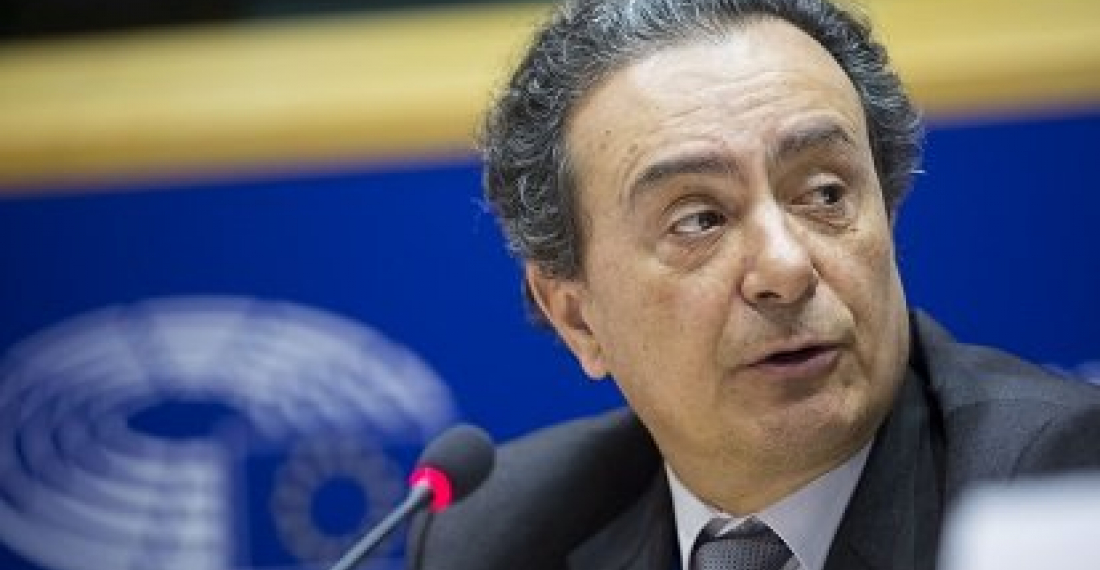Официальный представитель EEAS Адриано Мартинс в ходе мероприятия LINKS-EPC в Европейском Парламенте 7 марта рассказал о том, как ЕС видит свои отношения с Азербайджаном.
"Азербайджан является важным партнером для ЕС, а также является партнером в рамках Восточного партнерства, где шесть партнеров и ЕС привержены к поддержке демократических ценностей, прав человека и свободного рынка. Мы работаем вместе в этой политической и рамочной программе сотрудничества для решения проблем и развития более тесных отношений на основе равного партнерства и взаимной выгоды". Об этом заявил заместитель начальника отдела Восточного партнерства Службы внешних действий Европейского Союза Адриано Мартинс на конференции "Отношения ЕС-Азербайджан: переход на более высокий уровень", которая была организована LINKS и EPC в Европейском парламенте во вторник, 7 марта 2017 года.
В числе других выступающих были заместитель министра иностранных дел Азербайджана Махмуд Мамедгулиев; Депутаты Европарламента Хейди Хаутала и Андрей Мамикинс, депутат Фуад Мурадов, глава делегации Азербайджана в Парламентской ассамблее Евроснеста; Каваннансир Фейзиев, сопредседатель Межпарламентского комитета Азербайджана-ЕС; Ровзан Рзаев, Мэтью Брайза (Атлантический совет), Ахмад Алили (CESD) и Деннис Саммут (LINKS). Мероприятие возглавила Аманда Пол (EPC).
Вы можете узнать больше о конференции здесь
В своем выступлении Адриано Мартинс отметил ощутимые результаты позитивной тенденции в отношениях между ЕС и Азербайджаном, включая успешный визит президента Алиева в Брюссель 6 февраля; начало переговоров по новому соглашению; возобновление контактов в рамках СПС, что уже привело ко всем четырем заседаниям подкомитетов (после паузы в два года); и возобновление сотрудничества между парламентом Азербайджана и Европейским Парламентом". Я убежден, что переговоры и новое соглашение будут способствовать углублению наших отношений, поднимая их на уровнь институтов, принося людям реальные и устойчивые выгоды. С нетерпением ожидаю обсуждения этого текста в нашем следующем раунде переговоров в конце апреля в Баку", - сказал Мартинс.

Говоря об истории отношений между ЕС и Азербайджаном, Мартинс сказал:
"В 2016 году мы отметили 25 лет отношений между независимым Азербайджаном и ЕС. За эти годы мы прошли долгий (и не всегда легкий) путь, включая предыдущие попытки обновить нашу нынешнюю правовую базу, но сегодня мы настроены на продвижение нашего сотрудничества ради наших общих интересов. Решение о начале переговоров по новому соглашению отражает эволюцию непрерывного укрепления нашего партнерства на основе нашего первого Соглашения о партнерстве и сотрудничестве (СПС), которое вступило в силу в 1999 году. С тех пор Азербайджан сильно изменился, равно как и ЕС.
Новое соглашение должно также позволить нам начать работу на основе существующего СПС и расширить сферу наших отношений, принимая во внимание пересмотр европейской политики соседства, а также новые глобальные политические и экономические вызовы, с которыми мы сталкиваемся.
Запуск переговоров также является результатом подготовленного Азербайджаном проекта предложения «Соглашение о стратегическом партнерстве», переданного на саммите Восточного партнерства в Риге, и соответствует вашей заинтересованности в скорейшем начале переговоров. Это должно позволить нам начать работу на основе существующего Соглашения о партнерстве и сотрудничестве между ЕС и Азербайджаном в целях расширения сферы наших дружеских отношений, принимая во внимание пересмотр европейской политики соседства, а также новые глобальные политические и экономические вызовы, с которыми мы сталкиваемся.
Секторальное сотрудничество должно быть амбициозным. В настоящее время появляются новые возможности в таких областях, как туризм, инфраструктура и транспортные связи. Важными аспектами являются возможности участия компаний ЕС в государственных закупках. ЕС готов сотрудничать и поддерживать Азербайджан в этом отношении, он открыт для расширения и открытия новых сфер сотрудничества.
Г-н Мартинс затронул вопрос гос. управления и прав человека и определил позицию и ожидания Европейского Союза:
"Ожидания сильного нового партнерства высоки. В этом отношении жизненно важна хорошо функционирующая демократия с прочной системой сдержек и противовесов. Мы считаем, что переговорный процесс будет руководствоваться твердой приверженностью к ценностям демократии, к уважению прав человека, а также принципам рыночной экономики, которые были выражены государствами-членами ЕС в связи с принятием нами мандата по переговорам.
ЕС по-прежнему обеспокоен по поводу ситуации с правами человека. Некоторые активисты все еще находятся в тюрьме, а некоторые из них были задержаны и приговорены к суровым наказаниям. ЕС ожидает, что Азербайджан будет соблюдать свои международные обязательства как в отношении основных свобод, так и надлежащей правовой процедуры. Касательно конституционных поправках, принятых в ходе референдума 26 сентября 2016 года, мы призвали Азербайджан учитывать мнение Венецианской комиссии Совета Европы, особенно когда это касается реализации этих поправок, как в отношении их содержания, так и в отношении окружающего процесса.
Говоря о новом соглашении, Адриано Мартинс сказал: "Политические реформы и экономическое сотрудничество будут важными аспектами наравне с нашими стратегическими энергетическими отношениями и важностью роли Южного газового коридора в стратегии ЕС по диверсификации наших источников энергии и транспортных маршрутов. В то же время это соглашение должно помочь нашим гражданам и компаниям сблизиться и извлечь максимальную пользу из новых возможностей".
источник: commonspace.eu






